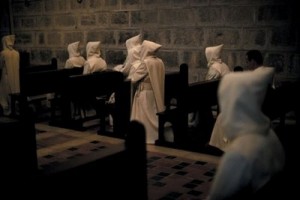“Holy God, Holy Mighty One, Holy Immortal One, have mercy on us and on the whole world.”
Now, as Pope Benedict has declared the coming year as the Year of Faith, Fr. Louis explains clearly and simply what faith means. What follows are thoughts from the prologue of his “The Silent Life,” published in 1957.
I came across these words a few years ago, when I was reading all I could that Merton had written. When I read them, I couldn’t help changing the words “monk” and “monasticism” to “Catholic” and “Catholicism”, because when I did, they helped answer the statement “Why I Am Catholic” very effectively. Fr. Louis has the floor,
Let us face the fact that the monastic vocation tends to present itself to the modern world as a problem and as a scandal.
In a basically religious culture, like that of India, or of Japan, the monk is more or less taken for granted. When all society is oriented beyond the mere transient quest of business and pleasure, no one is surprised that men should devote their lives to an invisible God.
In a materialistic culture, which is fundamentally irreligious, the monk is incomprehensible because he “produces nothing.” His life appears to be completely useless. Not even Christians have been exempt from anxiety over this apparent “uselessness” of the monk, and we are familiar with the argument that the monastery is a kind of dynamo which, though it does not “produce” grace, procures this infinitely precious spiritual commodity for the world.
The first Fathers of monasticism were concerned with no such arguments, valid though they may be in their proper context. The Fathers did not feel that the search for God was something that needed to be defended. Or rather, they saw that if men did not realize in the first place that God was to be sought, no other defence of monasticism would avail them.
The deepest law in man’s being is his need for God, for life. God is Life. “In Him was life, and the life was the light of men, and the light shineth in the darkness and the darkness comprehended it not” (John 1:5). The deepest need of our darkness is to comprehend the light which shines in the midst of it. Therefore God has given us his first commandment:
Thou shalt love the Lord thy God with thy whole heart, and with thy whole soul, and with all thy strength.
The monastic life is nothing but the life of those who have taken the first commandment in deadly earnest, and have, in the words of St. Benedict, “preferred nothing to the love of Christ.”
But Who is God? Where is He? Is Christian monasticism a search for some pure intuition of the Absolute? A cult of supreme Good? A worship of perfect and changeless Beauty? The very emptiness of such abstractions strikes the heart cold. The Holy One, the Invisible, the Almighty is infinitely greater and more real than any abstraction of man’s devising. But he has said: “No one shall see me and live” (Exodus 33:20). Yet the monk persists in crying out with Moses: “Show me Thy face” (Exodus 33:13).
The monk, then, is one who is so intent upon the search for God that he is ready to die in order to see Him. That is why monastic life is a “martyrdom” as well as a “paradise,” a life that is at once “angelic” and “crucified.”
St. Paul resolves the problem: “God who commanded the light to shine out of darkness, hath shined in our hearts to give the light of the knowledge of the glory of God, in the face of Christ Jesus” (2 Corinthians 4:6).
The monastic life is the rejection of all that obstructs the spiritual rays of this mysterious light. The monk is one who leaves behind the fictions and illusions of a merely human spirituality in order to plunge himself in the faith of Christ. Faith is the light which illumines him in mystery. Faith is the power which seizes upon the inner depths of his souls and delivers him up to the action of the divine Spirit, the Spirit of liberty, the Spirit of love. Faith takes him, as the power of God took the ancient prophets, and “stands him upon his feet” (Ezekiel 2:2) before the Lord. The monastic life is the life in the Spirit of Christ, a life in which the Christian gives himself entirely to the love of God which transforms him in the light of Christ.
“The Lord is a Spirit, and where the Spirit of the Lord is, there is liberty. But we all, beholding the glory of the Lord with open face, are transformed into the same image from glory to glory, as by the Spirit of the Lord” (2 Corinthians 3: 17-18).
What St. Paul has said of the inner life of every Christian becomes in all truth the main objective of the monk, living in his solitary cloister. In seeking Christian perfection the monk seeks the fullness of the Christian life, the complete maturity of the Christian faith. For him, “to live is Christ.”
Amen. It’s time to harness our inner monks and crank up the dynamo of prayer.












